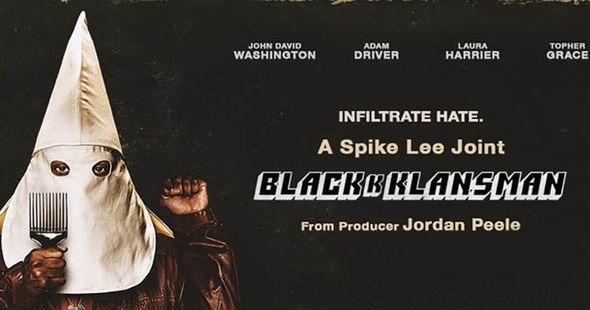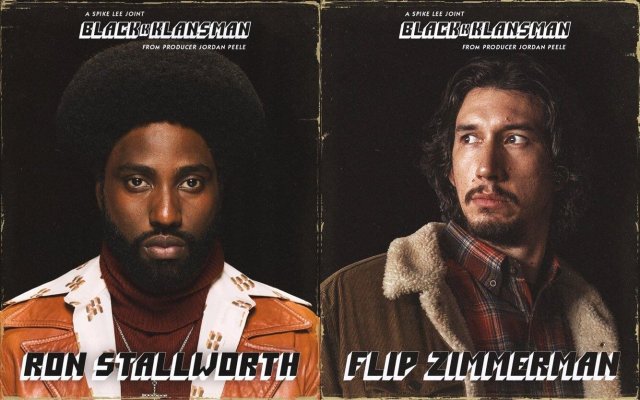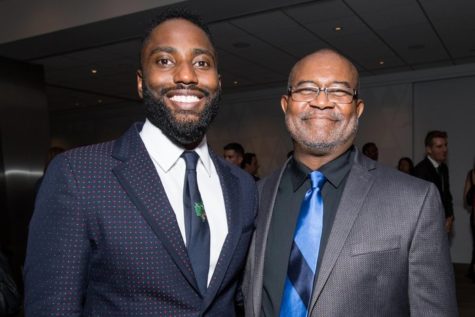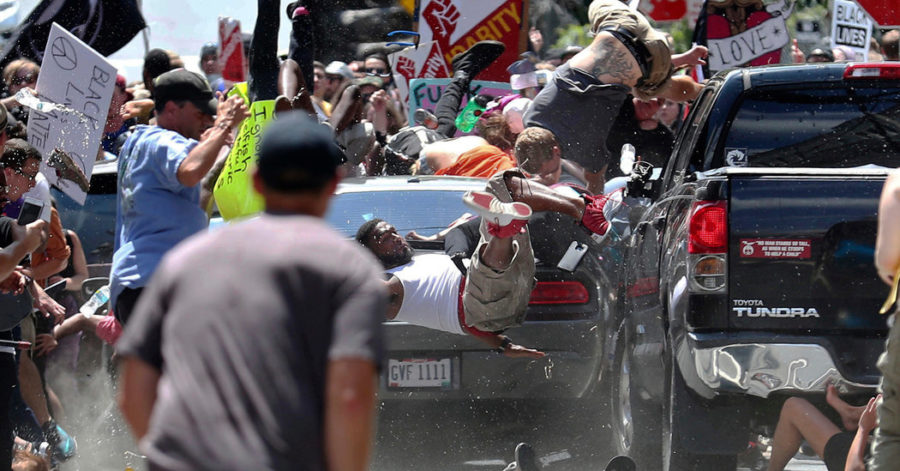
By: Lucy Terry | News Editor
September 12, 2018
It can be easily said that BlacKkKlansman is revolutionary director Spike Lee’s latest stroke of genius. BlacKkKlansman is the remarkable true story about the efforts of Ron Stallworth (John David Washington), the first black detective at the Colorado Springs Police Department, to make a name for himself by infiltrating the Klu Klux Klan. Stallworth recruits Jewish co-worker Flip Zimmerman (Adam Driver) to collaborate with him while the rest of the CSPD is unsupportive. While Stallworth collects intel, antagonizes via phone calls, and plots against the local KKK group, it is Zimmerman that passes as the bigot for in person meetings with the Klan, or as members call it, “the Organization.”
Stallworth and Zimmerman are undoubtedly a dynamic duo, same as the energy that Washington and Driver bring to the big screen; the chemistry these two share is riveting and spectacular. Lee artfully illustrates what it means to be black or Jewish in America, and astutely juxtaposes the two narratives and how each character faces the bigotry. Yet it is the portrayal of authentic details in the movie that makes it so sensational. Stallworth maintains that there were some fictitious aspects to the story, such as Laura Harrier’s Patrice Dumas, a fierce activist and companion to his movie self. However, he confirms much of what happened in the movie is real; it is true that he discovered military members and veterans serving as klansmen, that he prevented numerous cross-burnings during his seven-and-a-half month investigation, and that he spoke to David Duke on the phone while attempting to expedite his KKK membership card and then held many conversations with him after this. Stallworth astonishingly describes the infamous Grand Wizard as a “pleasant conversationalist” in an interview with Time magazine.

(right) as Flip Zimmerman.
Bella Guarascio, a senior at SCHS, was shocked that this was the first time she had heard of Stallworth’s narrative. “I’m definitely surprised I’d never heard about it, because it seems like a really interesting and important part of history that you would think more people should know about, but obviously don’t. It’s a really shocking topic and I think it’s awesome that they made a movie about it.”
The movie is both socially and politically charged throughout, thanks to Lee’s commentary on modern day politics and the remaining undercurrent of cultural and institutionalized racism. In one scene in the movie, Stallworth talks to a fellow police officer about the probability of David Duke running for political office; he claims, “America would never elect someone like David Duke.” This is could be a reference to our current president, Donald Trump, who many believe is inherently racist due to his failure to condemn white supremacists, even David Duke himself. Towards the end, KKK members chant “America First” after watching The Birth of a Nation, and this again could be a connection to Trump’s other notorious slogan. Lee outlines the tension between police and black people in the 1970s in a way that is requiescent of our own time – his duality in depicting two opposing social forces, radical black activists and reactive fascists, is utterly outstanding.

It is also worth mentioning the film’s poignant release date of August 10th, which is exactly one year after the Charlottesville riots in 2017. In fact, there is a direct allusion to these riots at the very end of the movie; Lee inserts several haunting clips, pictures, and eyewitness accounts of the clash between black activists and white supremacists in Virginia, including footage of the travesty that took place in which a white supremacist drove a car into a group of protestors and killed one white woman, Heather D. Heyer. This emotional culmination of the film undoubtedly meant to impart a message upon the viewers to follow them long after the credits stopped rolling.
This underscore of modern social commentary is so strong that many wonder if Lee intentionally made this movie more about modern times than the 1970s. Others ask why he didn’t create this film sooner if the story is decades old. Chandler Eldridge, 12, believes the release of BlacKkKlansman was a calculated decision; “I think the movie still would have been pretty successful if it had been released earlier, because when I first saw the trailer I wasn’t even really thinking about how it related to the current political climate. But I think it’s even more impactful now because the audience can draw parallels between acts of hatred and violence during the time of the movie and our current time.”

While BlacKkKlansman has been widely celebrated, garnering high reviews on practically every film review website out there, including a 95% Fresh on Rotten Tomatoes, it has also acquired criticism from people all over the social and political spectrum. Despite the judgement by some, it is still an undeniably American story; captivating but sickening, powerful but shameful. It’s a old story highlighting the renewed, timeworn bigotry and hatred that has gripped our country, which is what makes this the cinematic pinnacle of 2018.

Um, I beg to differ. The Slenderman movie is the best movie of the year—
Nah I’m just messing with y’all.
10/10 would highly recommend reading this article. Lucy Terry is a beast.